By James Mackenzie
CAMP BASTION, Afghanistan (Reuters) - While Washington works on plans to send more troops to Afghanistan, U.S. forces on the ground are grappling with building an army in the middle of a war their commanders say is locked in stalemate.
It is slow, hot, often frustrating work, ranging from overseeing basic infantry training to trying to create modern logistics systems for an army in which many soldiers cannot read or write.
"There are enormous challenges ahead," said Brig. Gen. Roger Turner, who led a task force in Helmand five years ago and who has returned as commander of around 300 Marines training and advising the Afghan army and police.
When the Marines left Helmand in 2014, they did not expect to return, but building the Afghan army has been slower than anticipated. Many issues trainers focus on, such as improving army leadership or getting troops off vulnerable checkpoints, are ones American advisers have recommended for years.
Insurgents control five of Helmand's 14 districts and contest the others, threatening the capital Lashkar Gah, where they have a strong foothold just outside the city centre.
Afghan forces are suffering thousands of casualties and without near-daily air strikes by U.S. fighters and helicopters, said Colonel Asmatullah Gharwal, intelligence officer for the Afghan army 215th Corps, "we would probably not be able to defend Helmand province."
With U.S. commanders declaring that Afghanistan faces "stalemate", the Pentagon is expected to add between 3,000-5,000 troops to more than 13,000 coalition forces already there though there are no signs it plans to send them into combat.
That would leave the task essentially unchanged - not to defeat the Taliban but to get Afghan forces to a point where they can fight alone and force the insurgents to negotiate.
For Turner, the key is improving army leadership, an issue U.S. advisers have stressed constantly but with mixed success since the NATO-led coalition ended combat operations in 2014.
For years, the government's hold on Helmand, one of the world's major opium-producing regions, has been undermined by corruption reaching to the senior ranks of the military. The last commander of the 215th Corps, appointed to clean up the unit last year, was arrested after stealing his own soldiers' food and firewood.
But the Americans have been impressed by his successor, General Wali Mohammad Ahmadzai, a former commando who has replaced about 50 senior officers. Turner said the government in Kabul was now more serious about replacing ineffective leaders.
"When we were here before, you could have a completely ineffective leader in position and you'd pretty much just have to deal with it."
"DOING THEIR JOB"
Camp Bastion, the dusty patch of tents, containers and barbed wire where the Marines are based, is a shadow of the sprawling complex coalition troops occupied at the height of the war when more than 100,000 of them fought the Taliban.
Instead of conducting combat patrols, as many did on previous deployments, Turner's Marines work with Afghans, training soldiers and helping plan and carry out missions to defend the province.
"The first thing, as with anything, is re-establishing security," said Col. Matthew Reid, Turner's second-in-command, adding that while Lashkar Gah had been held, "the outlying districts have been more at risk than anticipated."
Although they are no longer normally in combat, so-called "green-on-blue" insider attacks by Afghan soldiers remain a threat.
U.S. advisers were also closely involved in recent Afghan reinforcement and resupply operations in the heavily contested towns of Sangin and Marjah, scene of one of the biggest battles the Marines fought in Afghanistan, when they were there in 2010.
Both operations were judged by the advisers as big successes, involving considerable planning and preparation and clearing dozens of roadside bombs.
For the Marines, such successes should encourage local forces to get off checkpoints and onto the offensive, where they generally suffer far fewer casualties, although many in the Afghan army would clearly welcome more support.
"We lost five districts to the Taliban," said Col. Gharwal of the 215th Corps. "If we have ground forces with us from the Marine Corps to clear these districts, then I am sure we will have very good security."
That is unlikely to happen without a major strategic shift from Washington. Meanwhile, the Marines work with Afghan instructors, teaching everything from clearing mines to coordinating mortar fire.
"I was excited to come back to Helmand," said Staff Sergeant George Caldwell, as he watched soldiers practising raiding a house. "The way they conduct operations now is completely different. I can see the improvement from five years ago."
Many questions remain about whether Afghanistan's mix of corruption and political dysfunction will outweigh any progress made and whether after 16 years of American presence in Afghanistan, a new approach is needed.
But in Helmand, the Marines leave those questions for others.

"I'm a big believer in everyone doing their job as well as they can," Turner said. "That's how I reconcile this stuff and make sure we don't lose focus on issues beyond our control."